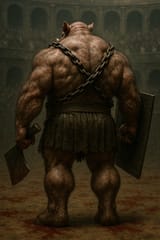Search Results
!!ksznD1Xs7EU/tg/96064491#96065487
7/11/2025, 7:56:46 PM
>>96065448
>The Rise of the Butcher
His first fight was meant to be a novelty: Lanius versus three half-dead slaves. He crushed them within heartbeats. The crowd, once jeering, sat stunned. Then they roared.
Fight after fight, Lanius slaughtered man and beast alike. Tigers, Nubian warriors, Germanic berserkers—none returned from the arena when pitted against the Boar of Rome. He earned a new name: Macellarius, meaning Butcher. Arena poets called him the Swine of Ares, and the Colosseum floor was his temple.
Some claimed he understood Latin. Others swore they saw him salute the emperor. Every night, he would return to his cell and sharpen his cleaver on stone, a ritual as holy as prayer.
>The Rebellion of the Arena
With each victory, fear grew. Some senators warned Caesar that Lanius was no beast but a divine punishment, a creature of Nemesis sent to humble Rome's arrogance. Caesar, amused, invited Lanius to a grand spectacle: a fight against sixteen armed men, all disgraced legates sentenced to death.
They never stood a chance.
As Lanius stood over their mangled bodies, the crowd fell silent—until Caesar stood, raised his arm, and laughed.
“Ave Lanius, our iron-snouted Mars!”
>Legacy in Blood and Bronze
No one knows how Lanius met his end. Some say he was poisoned by jealous nobles. Others whisper he vanished into the catacombs beneath the Colosseum, still alive, watching. Centuries later, Roman soldiers would etch a crude pig onto their shields for luck—snout, chains, cleaver in hand.
And in the shadow of the Colosseum, when the wind is right, some swear they hear the clink of iron chains and the dull scrape of a cleaver on stone.
>The Rise of the Butcher
His first fight was meant to be a novelty: Lanius versus three half-dead slaves. He crushed them within heartbeats. The crowd, once jeering, sat stunned. Then they roared.
Fight after fight, Lanius slaughtered man and beast alike. Tigers, Nubian warriors, Germanic berserkers—none returned from the arena when pitted against the Boar of Rome. He earned a new name: Macellarius, meaning Butcher. Arena poets called him the Swine of Ares, and the Colosseum floor was his temple.
Some claimed he understood Latin. Others swore they saw him salute the emperor. Every night, he would return to his cell and sharpen his cleaver on stone, a ritual as holy as prayer.
>The Rebellion of the Arena
With each victory, fear grew. Some senators warned Caesar that Lanius was no beast but a divine punishment, a creature of Nemesis sent to humble Rome's arrogance. Caesar, amused, invited Lanius to a grand spectacle: a fight against sixteen armed men, all disgraced legates sentenced to death.
They never stood a chance.
As Lanius stood over their mangled bodies, the crowd fell silent—until Caesar stood, raised his arm, and laughed.
“Ave Lanius, our iron-snouted Mars!”
>Legacy in Blood and Bronze
No one knows how Lanius met his end. Some say he was poisoned by jealous nobles. Others whisper he vanished into the catacombs beneath the Colosseum, still alive, watching. Centuries later, Roman soldiers would etch a crude pig onto their shields for luck—snout, chains, cleaver in hand.
And in the shadow of the Colosseum, when the wind is right, some swear they hear the clink of iron chains and the dull scrape of a cleaver on stone.
Page 1
